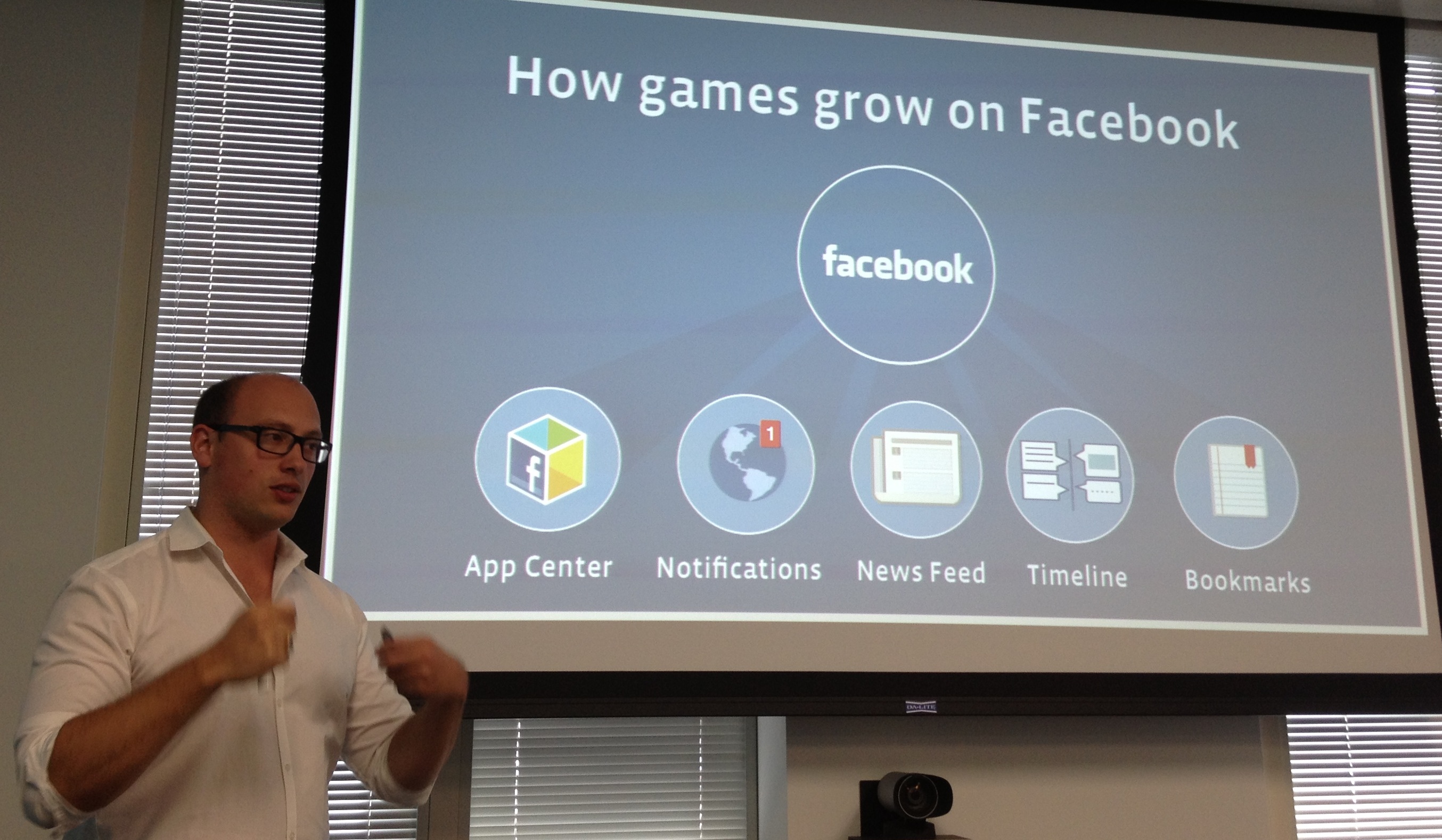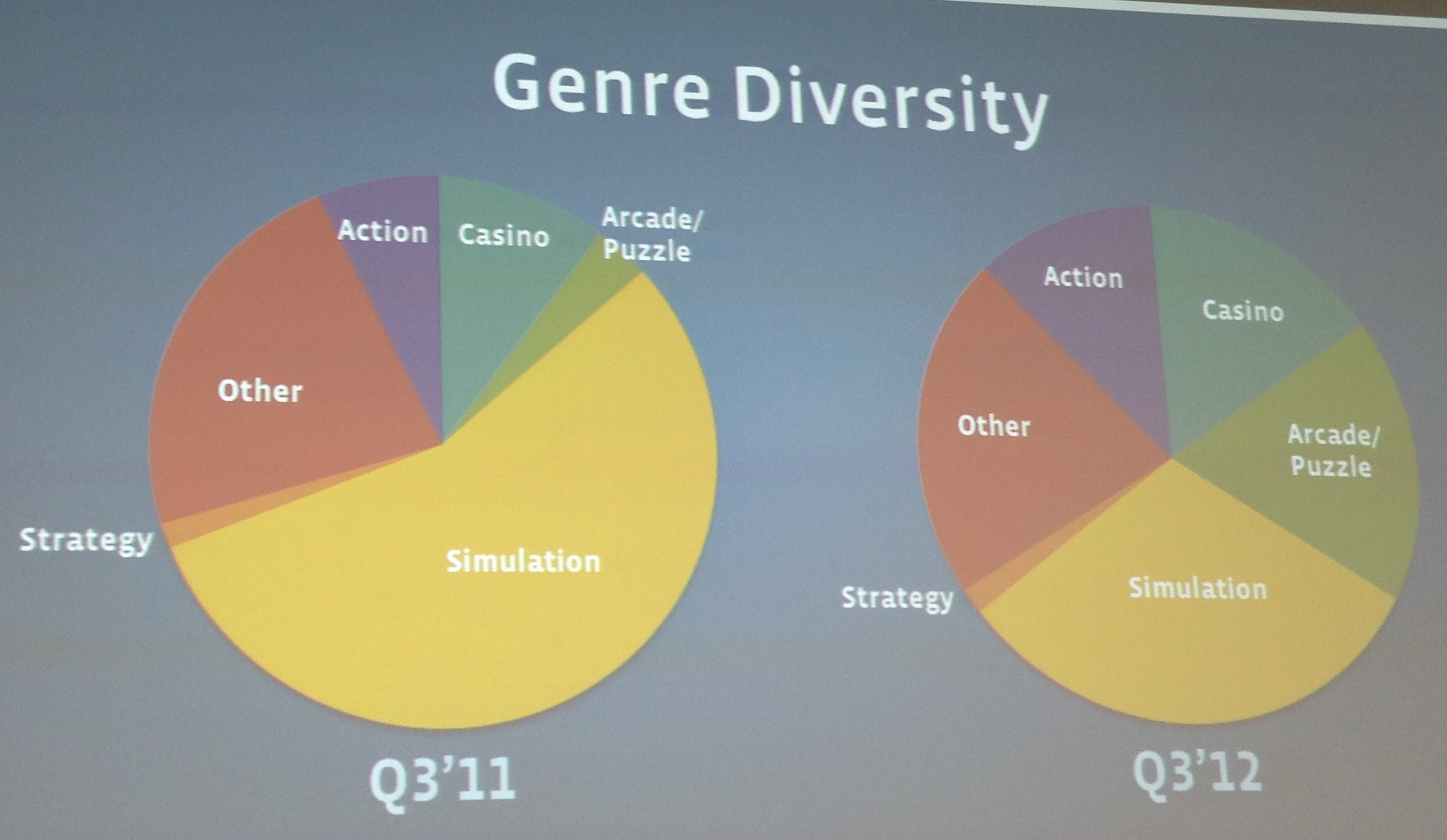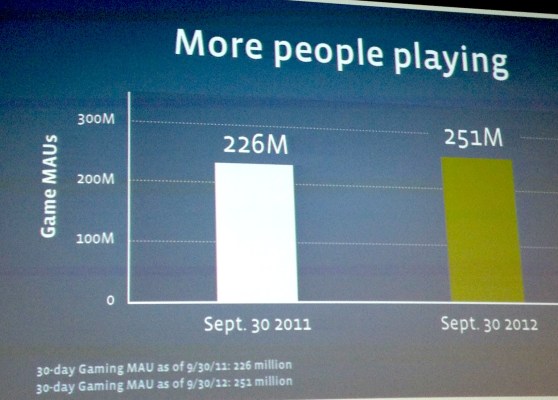“It used to be about as much spam as you could pump into the system as possible”, Facebook’s Alex Schultz told reporters today. But Facebook has managed to grow its gaming ecosystem 11% to 251 million users on its canvas games by keeping communication channels clean. And that doesn’t include Facebook-integrated mobile games. But can games growth keep up with user growth?
Facebook’s head of platform Dan Rose told reporters at a “whiteboard session” at Facebook’s 1 Hacker Way, Menlo Park HQ that games have seen a “real increase in quality over the last 12 months, and in the diversity of the games, genres, and developers.” Let’s dive into those trends.
Quality Leads To Quantity Of Users
On quality, Facebook’s director of growth Alex Schultz explained that at times in the past, Facebook was too lenient about how aggressively game developers could spam Facebook users. For example, devs could generate notifications that drowned out alerts about being tagged in photos or someone writing on your wall.
Schultz said “The channel got burned. There were spammy notifications and we weren’t adequately policing.” So users began ignoring game notifications, and Facebook shut them down. But now Facebook has relaunched the channel with a focus on quality. Developers get analytics about if their alerts are being marked as spam, and lose access to the channel if they get flagged to often. Now Schultz says the “relaunched active user notifications have been fantastically successful…[with] click through rates in the 30%-40% range.”

Facebook hopes its focus on more social, and less spammy channels will helps developers reduce churn. Schultz categorized the retention graphs Facebook games go through into 3 categories:
- Hits – Games that spike big but then churn out users faster than they gain them, leading to rapid loss over the long-term.
- Successes – Games that spike but then are good enough to retain most users and just slowly decline over time.
- Awesome – Games that might not be as popular at first, but are inherently social. As more friends try them, they get more fun, and are able to reach equilibrium or even sustained growth.

Facebook is trying to maximize this last category by giving developers more tools to make their games more friendly, like its revamped iOS and Android SDKs full of pre-made social widgets, analytics that show when they’re getting spammy, and ads that turn usage by people you know it recommendation for what you should play.
More Gamers, But Where?
At the end of September last year, Facebook had 226 million people playing Facebook Canvas games, and as of September 30th, 2012 it had 251 million, a full quarter of all Facebook users. And that does not include mobile games that hook into Facebook for sharing and personalization. Facebook doesn’t reveal how many integrated mobile games or gamers there are, but if you added that in, the gamer count could be a bigger chunk of Facebook’s total users. So in that case, the 11% increase doesn’t sound so bad.
Still, Facebook’s total user count grew 26% this year. And back in 2010, rumors and user surveys indicated half of all Facebook users played games.
Part of the issue is that users are signing up on mobile and 126 million now use the small-screen as their sole access point. Many of these people use feature phones that can’t access most Facebook-integrated games. Facebook needs extra games momentum amongst its mature markets like the US, Canada, and UK, as well as other smartphone-heavy locales to make up for the feature phone problem.
That momentum wasn’t strong enough in Q3, leading Mark Zuckerberg to say on Tuesday’s earnings call that “gaming on Facebook isn’t doing as well as I’d like.”
Games Of All Types From All Over
Facebook is seeing game developers coming from a wider set of countries and continents, including Africa, Russia, Australia, and especially Israel, which Facebook’s head of games Sean Ryan said “is on fire” right now. Facebook saw 450 gaming developers attend a recent meetup in Israel, a country of fewer than 8 million people.

The casino, arcade/puzzle, and mid-to-hardcore game categories are growing in popularity as the old farming and simulation game categories are shrinking in market share. Ryan believes mid-core games that are more advanced than the old cow-clicking frenzies will “explode” next year. That’s an apt choice of words, as more violent games like War Commander and Battle Pirates are dominating the mid-core market right now.

While payments from games declined 9 percent in Q3 to $176 million from $192 million, game developers are still critical to Facebook’s long-term success. Not only do they bring return visits to its sites and content to fill its feed, developers also buy a ton of ads. That’s why Rose reassured reporters “We have more resources inside Facebook dedicated to games than ever before.”
